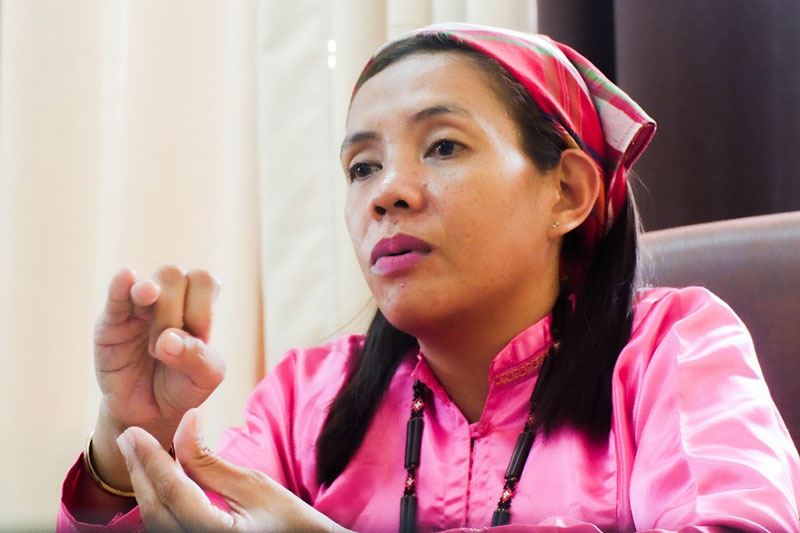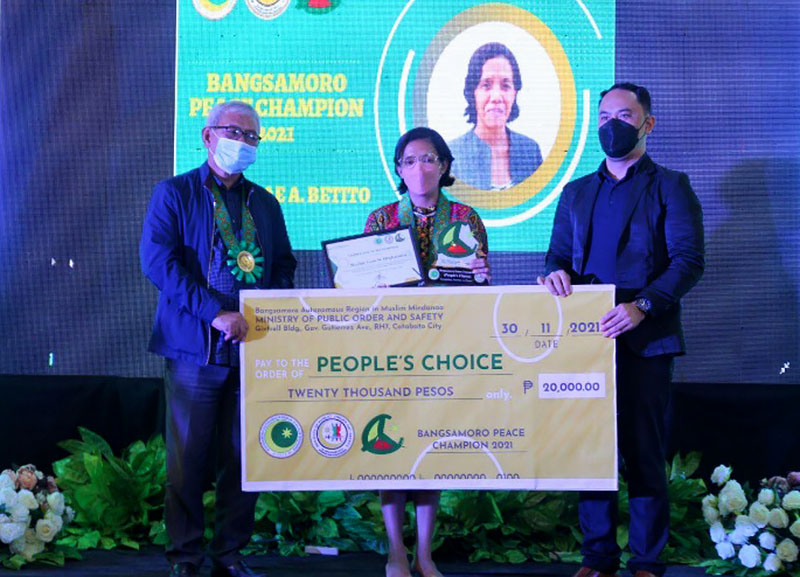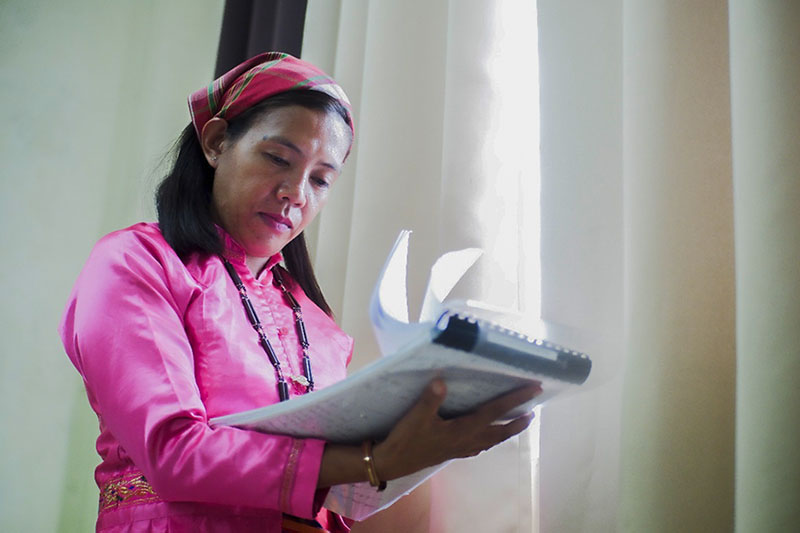In the heart of North Upi in Maguindanao del Norte, specifically in Barangay Rempes, a captivating story unfolds—a story of determination to overcome discrimination and the life-changing impact of peace and education.
 Helen Mae Betito’s story is an example of triumphing prejudices; a story of resilience and determination to conquer discriminations and stereotypes. (Photo by Hamdan Badrudin)
Helen Mae Betito’s story is an example of triumphing prejudices; a story of resilience and determination to conquer discriminations and stereotypes. (Photo by Hamdan Badrudin)
Meet Helen Mae Betito, an indigenous Teduray who emerges as a beacon of hope within her community, fueled by her ambition to bring positive change. Wearing multiple hats as a dedicated teacher and a peace advocate, Helen embodies the essence of strength and leadership.
At 35 years old, Helen is not only a devoted wife but also a mother of three. Her journey paints a vivid picture of unwavering resilience and determination, illustrating the compelling story of a woman who refuses societal stereotypes.
“Taga Upi, taga Upi, Teduray, Kulot!” she recalls the derogatory remarks hurled at her tribe as she navigated the city streets. These remarks stung, leaving scars that fueled her ambition.
Overcoming prejudice, Helen excelled in her studies, graduating with top honors from Kabug Kabug Elementary School and Rempes National High School in North Upi. These achievements paved the way for her to attend Ignatian College.
“I was able to study at the Ignatian College in Cotabato City because I was a consistent academic scholar. Without that, I wouldn’t have been able to afford studying in the city,” she explained
After completing college, Helen decided to try her luck by taking the licensure examination for teachers. Fortunately, she successfully passed the exams, thus becoming a professional teacher.
Yet, as she climbed up the academic ladder, discrimination persisted.
“We are well aware that being part of the Indigenous Peoples (IP), you get discriminated against. We are indeed marginalized,” Helen quipped.
“When they say you’re an IP, they limit us to being just mountain dwellers. Even among your fellow professionals, you may be told, ‘You can’t do that because you’re a Teduray,’” she confesses, recalling moments where the recognition garnered by various organizations failed to erase the deep-seated biases.
These are the real-life experiences that ignited the passion in her heart to do better, not just in her profession but in all aspects of life.
In 2013, Helen entered the Department of Education (DepEd) of the defunct Autonomous Region in Muslim Mindanao (ARMM). Embracing her role as a primary teacher, she found joy in the harvest of her efforts, proving the resilience of an IP.
The adversity became the catalyst for her metamorphosis. “I strived harder. The derogatory comments I received, they became my inspiration. I proved to them that an IP can be diligent,” Helen said.
Empowering Indigenous Peoples
Because of her passion for teaching, Helen has been an advocate of change, especially for the IPs. She recounted it was within the walls of Don E. Sero Elementary School that the seed of her advocacy took root.
It started with the “Pera Mo Para sa Kinabukasan Ko” project in 2017. It was more than just about money, she said. It’s a team effort involving young IP professionals, overseas Filipino workers (OFWs), and alumni pitching in to support less fortunate learners. It’s all about investing in the future by giving these kids the help they needed.
Then came “Dungaw at Damay.” This project was about looking into the lives of these learners. The teacher visits their homes to understand their challenges and figure out how to help.
“Dungaw” wasn’t just about checking on their school needs; it’s about getting to know their lives. On the other side, “Damay” was about giving more than just money. It’s giving a piece of clothing, showing that education is something every child deserves.
She said the goal of these projects is “Education for All.” Helen wants every child to have a chance to learn, no matter where they come from. By doing things like visiting homes and giving extra support, she hopes to make sure no kid drops out of school.
It was at the Don E. Sero Elementary School that a colleague, Reine S. Yu, witnessed Helen’s workaholic tendencies. “She doesn’t shy away from tasks. She’s helpful, and volunteers for tasks that she knows she can handle,” he said.
Another colleague at the same school, Johairah M. Casan, lauded Helen’s “Dungaw” advocacy, noting that a “a lot of IP pupils benefitted from it,” receiving toys, school supplies, and food.
The Don E. Sero Elementary School, Don E. Sero National High School, Kabug Kabug Elementary School, and Pura Elementary School in Maguindanao del Norte were selected as beneficiaries of school supplies and reading materials for IP learners and other underprivileged children through her innovative project.
Project TRI-Ps: A path to peace
Her dedication and determination to break stereotypes did not end there. One day, she witnessed young students, some from indigenous backgrounds, embroiled in conflicts spurred by discrimination. Helen was inspired to take action.
She recounted: “There were children quarreling, and I was affected by it. I had IP students, and one of them was being bullied simply because he was an IP.”
Helen saw this as an opportunity to break the stereotypes that cause conflicts, even among the youth. Because of this, she conceptualized her project called “TRI-Ps” or the People Peace Promotion in 2019.
This project aimed to build understanding and respect among people of different beliefs, culture, and tribe. Helen said the project was conceptualized in an environment where discrimination and misunderstanding were present.
“That’s where the TRI-Ps project was formed. I decided that this would be my advocacy. We teach, and we also teach peace. So, I thought, why not start right within the four corners of the classroom?” Helen revealed.
Reine himself noticed Helen’s dedication to peace, citing her calm demeanor and actions. “She practices what she preaches,” he added.
Helen’s Project TRI-Ps is an initiative dedicated to empowering Lumad, Muslim, and Settler learners and youth. The project’s mission is to shape them into peace builders, young leaders, and successful individuals, with a specific focus on producing numerous IP leaders and professionals.
Through a range of activities, including training workshops and lectures, Project TRI-P aims to motivate IP learners and less fortunate individuals to pursue education despite adversities. This multifaceted approach also emphasizes cultural identity, fostering self-confidence among tri-people and promoting resilience.
The project further provides essential support, such as school supplies, clothing, sleepers, feeding programs, and health and mental awareness activities, creating an environment that motivates sustained learning and personal growth.
Recognition and expansion
Because of this, Helen’s peace initiatives gained recognition from the Bangsamoro Government through the Ministry of Public Order and Safety (MPOS) in 2021.
Helen’s project got two awards: as finalist of the Bangsamoro Peace Champions with a P50,000 cash reward and the People’s Choice award with P20,000.
 Helen Mae Betito (center) poses with MPOS Minister Hussein Munoz (left) and MPOS Director-General Atty. Al-Rahid Balt (right) to receive her award as People’s Choice during the Bangsamoro Peace Champions awarding ceremony on November 30, 2021 in Cotabato City. (Photo courtesy of the Bangsamoro Information Office)
Helen Mae Betito (center) poses with MPOS Minister Hussein Munoz (left) and MPOS Director-General Atty. Al-Rahid Balt (right) to receive her award as People’s Choice during the Bangsamoro Peace Champions awarding ceremony on November 30, 2021 in Cotabato City. (Photo courtesy of the Bangsamoro Information Office)
The MPOS Bangsamoro Peace Champions is an annual event to recognize the peace work initiatives of individuals that impacted the communities, especially at the grassroots level.
The incentives she received from MPOS were used to assist the children of Upi, especially the less fortunate ones, in their schooling, and to continue the initiatives to foster understanding and peace in their community.
“The cash prize I received from MPOS was used to sustain my projects for IPs. I also provided cash assistance to IP professional youth leaders who are beneficiaries of my advocacy, and offered support to a feeding program and capacity-building initiatives, and to selected elementary pupils,” Helen said.
Building on the momentum gained in 2021, Helen continued her advocacy in 2022 and recently participated in the Ministry of Indigenous Peoples Affairs’ (MIPA) advocacies through the office of the Bureau of Indigenous People Education, and Member of Parliament Froilyn Mendoza.
In 2023, she received additional support from MIPA for her Indigenous Peoples advocacies, underscoring the collaborative efforts towards a common goal.
A proud IP and peace advocate
This was the same year she felt more empowered not just as an IP educator and peace champion, but also as a woman. Following an eight-year tenure in primary education, Helen transitioned to higher education.
In October 2023, Helen was designated as the Director for the Records Management Office at the Cotabato State University (CSU) in Cotabato City. She also earned her Doctorate in Educational Administration degree at the said institution.
“Being given such a role is a tremendous challenge for me, and I am grateful to our institution for entrusting me with this responsibility,” she said.
“I won’t simply label myself as ‘just an IP;’ I am, indeed, an IP. I am incredibly proud to introduce myself as one,” Helen stressed.
 Helen Mae Betito is now the Director for the Records Management Office at the Cotabato State University (CSU) in Cotabato City. (Photo by Hamdan Badrudin)
Helen Mae Betito is now the Director for the Records Management Office at the Cotabato State University (CSU) in Cotabato City. (Photo by Hamdan Badrudin)
BARMM’s continuous assistance
Helen expressed her profound gratitude to all the organizations that recognize the abilities of the IPs. One of them is the Bangsamoro Government.
She said since the establishment of BARMM, she felt that IPs are no longer left behind.
In terms of assistance, may it be school initiatives, infrastructure projects, livelihood assistance, advancing rights of women and children, the IP community can rely on the BARMM Government.
“The BARMM Government has initiated numerous projects for the people of Upi. And I truly felt the presence of BARMM in support of our IPs,” Helen said.
But Helen was also candid in recognizing the fact that despite these initiatives from the government, there are still IP communities who still suffer from poverty, especially those in the remote areas.
She expressed hope that, one day, the Bangsamoro Government will successfully fight to reduce, if not eradicate, poverty. Helen believes that poverty can impact the peace and order situation of a community.
Helen’s true meaning of peace
Meanwhile, Helen described her own perceptions of the term “peace.”
She said the true meaning of peace does not only pertain to the absence of war in a place or a community.
“As an IP and educator, peace is having equal respect, rights, and receiving equal allocation [from government]. If poverty persists, it will also become a hindrance to achieving true peace,” Helen explained.
Helen’s story proves that determination can overcome barriers and stereotypes, and that education emerges as the key to addressing challenges, fostering lasting peace, understanding, and development in diverse communities.
(Aisah S. Abas works as Information Officer III at the Print Section of the Bangsamoro Information Office – BARMM. This article is supported by the Activate Bangsamoro project of The Asia Foundation with grant from the UK Government.)
